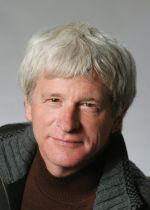Go to
Jan M. Rabaey
The Future of Electrical Engineering
17 December 2009, EPFL Polydome
 Jan M. Rabaey
Jan M. Rabaey
Professor
Berkeley Wireless Research Center, co-director
Electrical Engineering and Computer Sciences
University of California, Berkeley, California
Webpage
Thursday, 17 December 2009 (10h45-11h30), EPFL Polydôme
The "Meaning" of Electrical Engineering
Over the past hundred--‐some years, the field of "electrical engineering" has undergone many changes. The birth of the field definitely can be found in the power arena. Over time, it has evolved to span the acquisition, transmission and processing of electrical and electromagnetic signals and the development of devices and circuits doing so. With the growth of the field and the resulting complexity, higher level abstractions and signal synthesis and analysis techniques started playing a gradually increasing role. Today, the field of electrical engineering has by and large bifurcated into two domains: the "physical" layer, which deals with the sensing, generation, processing and communication of electrical or electromagnetic signals, and the "systems layer", which considers the synthesis, processing, analysis and recognition of signals. The former includes sensors, electronic devices, and circuits for processing and communication of signals; the later spans the fields of signal processing, communications, information theory, information processing, and control.
When evaluating the trends in the field, it becomes obvious that both areas are transcending their original meaning, and have become much broader than the purely electrical and electromagnetic. The "physical" domain increasingly spans computational and communication platforms based on physical, chemical, biological and mechanical mechanisms. The same is true for the systems space, where the signals under study are quite generic and are totally disconnected from their original electrical meaning. In short, the "electrical" in "electrical engineering" seems to become a misnomer.
Based on this, we have to truly consider if the partitioning of the engineering field as it exists today, (mostly as it emerged from the industrial revolution) truly makes sense. The be truly effective in a world where the systems under study are truly multi-disciplinary and boundary-crossing, it is definitely worthwhile to ponder how to better structure the engineering field. The essential outcome remains the same: provide for the engineers of the future the core knowledge and basic skill set to design the systems of the future.
About the speaker:
Jan Rabaey received his Ph.D degree in applied sciences from the Katholieke Universiteit Leuven, Belgium. After being connected to UC Berkeley as a Visiting Research Engineer, he was a research manager at IMEC, Belgium. In 1987, he joined the faculty of the Electrical Engineering and Computer Science department of the University of California, Berkeley, where he now holds the Donald O. Pederson Distinguished Professorship. From 1999 until 2002, he served as the Associate Chair of the EECS Dept of UC Berkeley. He is currently the scientific co-director of the Berkeley Wireless Research Center (BWRC), as well as the director of the MARCO GigaScale Systems Research Center (GSRC).
He is the recipient of a wide range of awards, amongst which IEEE Fellow, the 2008 IEEE CAS Society Mac Van Valkenburg Award, and the 2009 European Design Automation Association (EDAA) Lifetime Achievement award.Prof. Rabaey serves on the technical advisory board of a range of companies and research institutes focused in the areas of design automation, semiconductor intellectual property and wireless systems.
His research interests include the conception and implementation of next-generation integrated wireless systems.
Download presentation slides (2.2 MB pdf)
Secondary navigation
- EPFL Workshop on Logic Synthesis and Emerging Technologies
- Luca Amaru
- Luca Benini
- Giovanni De Micheli
- Srini Devadas
- Antun Domic
- Rolf Drechsler
- Pierre-Emmanuel Gaillardon
- Jie-Hong Roland Jiang
- Akash Kumar
- Shahar Kvatinsky
- Yusuf Leblebici
- Shin-ichi Minato
- Alan Mishchenko
- Vijaykrishnan Narayanan
- Ian O'Connor
- Andre Inacio Reis
- Martin Roetteler
- Julien Ryckaert
- Mathias Soeken
- Christof Teuscher
- Zhiru Zhang
- Symposium on Emerging Trends in Computing
- Layout synthesis: A golden DA topic
- EPFL Workshop on Logic Synthesis & Verification
- Luca Amaru
- Luca Benini
- Robert Brayton
- Maciej Ciesielski
- Valentina Ciriani
- Jovanka Ciric-Vujkovic
- Jason Cong
- Jordi Cortadella
- Giovanni De Micheli
- Antun Domic
- Rolf Drechsler
- Henri Fraisse
- Paolo Ienne
- Viktor Kuncak
- Enrico Macii
- Igor Markov
- Steven M. Nowick
- Tsutomu Sasao
- Alena Simalatsar
- Leon Stok
- Dirk Stroobandt
- Tiziano Villa
- Symposium on Emerging Trends in Electronics
- Raul Camposano
- Anantha Chandrakasan
- Jo De Boeck
- Gerhard Fettweis
- Steve Furber
- Philippe Magarshack
- Takayasu Sakurai
- Alberto Sangiovanni-Vincentelli
- Ken Shepard
- VENUE
- Panel on Circuits in Emerging Nanotechnologies
- Panel on Emerging Methods of Computing
- Panel on The Role of Universities in the Emerging ICT World
- Panel on Design Challenges Ahead
- Panel on Alternative Use of Silicon
- Nano-Bio Technologies for Lab-on-Chip
- Functionality-Enhanced Devices Workshop
- More Moore: Designing Ultra-Complex System-on-Chips
- Design Technologies for a New Era
- Nanotechnology for Health
- Secure Systems Design
- Surface Treatments and Biochip Sensors
- Security/Privacy of IMDs
- Nanosystem Design and Variability
- Past Events Archive
Links
Watch the presentations on EPFL TV
